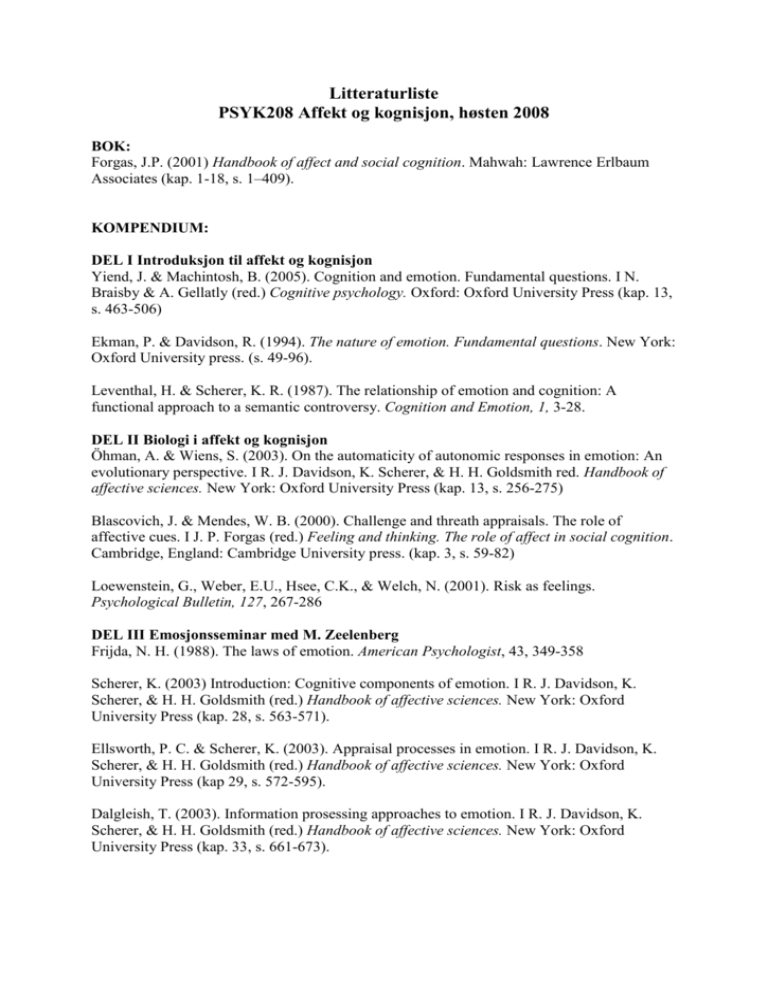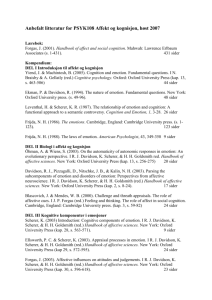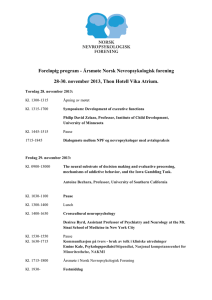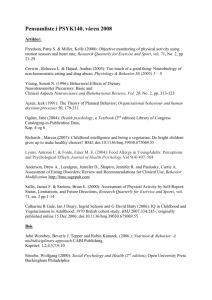Pensumoversikt: Psyk 108 Affekt og kognisjon
advertisement

Litteraturliste PSYK208 Affekt og kognisjon, høsten 2008 BOK: Forgas, J.P. (2001) Handbook of affect and social cognition. Mahwah: Lawrence Erlbaum Associates (kap. 1-18, s. 1–409). KOMPENDIUM: DEL I Introduksjon til affekt og kognisjon Yiend, J. & Machintosh, B. (2005). Cognition and emotion. Fundamental questions. I N. Braisby & A. Gellatly (red.) Cognitive psychology. Oxford: Oxford University Press (kap. 13, s. 463-506) Ekman, P. & Davidson, R. (1994). The nature of emotion. Fundamental questions. New York: Oxford University press. (s. 49-96). Leventhal, H. & Scherer, K. R. (1987). The relationship of emotion and cognition: A functional approach to a semantic controversy. Cognition and Emotion, 1, 3-28. DEL II Biologi i affekt og kognisjon Öhman, A. & Wiens, S. (2003). On the automaticity of autonomic responses in emotion: An evolutionary perspective. I R. J. Davidson, K. Scherer, & H. H. Goldsmith red. Handbook of affective sciences. New York: Oxford University Press (kap. 13, s. 256-275) Blascovich, J. & Mendes, W. B. (2000). Challenge and threath appraisals. The role of affective cues. I J. P. Forgas (red.) Feeling and thinking. The role of affect in social cognition. Cambridge, England: Cambridge University press. (kap. 3, s. 59-82) Loewenstein, G., Weber, E.U., Hsee, C.K., & Welch, N. (2001). Risk as feelings. Psychological Bulletin, 127, 267-286 DEL III Emosjonsseminar med M. Zeelenberg Frijda, N. H. (1988). The laws of emotion. American Psychologist, 43, 349-358 Scherer, K. (2003) Introduction: Cognitive components of emotion. I R. J. Davidson, K. Scherer, & H. H. Goldsmith (red.) Handbook of affective sciences. New York: Oxford University Press (kap. 28, s. 563-571). Ellsworth, P. C. & Scherer, K. (2003). Appraisal processes in emotion. I R. J. Davidson, K. Scherer, & H. H. Goldsmith (red.) Handbook of affective sciences. New York: Oxford University Press (kap 29, s. 572-595). Dalgleish, T. (2003). Information prosessing approaches to emotion. I R. J. Davidson, K. Scherer, & H. H. Goldsmith (red.) Handbook of affective sciences. New York: Oxford University Press (kap. 33, s. 661-673). Zeelenberg, M. & Pieters, R. (2006). Feeling is for doing: A pragmatic Approach to the study of emotions in economic behaviour. I D. De Cremer, M. Zeelenberg, & K. Murninghan (Eds.). (2006). Social Psychology and Economics. Mahwah, NJ: Erlbaum. Ketelaar, T. (2004). “Ancestral emotions, current decisions: Using evolutionary game theory to explore the role of emotions in decision making”. I Crawford, C., & Salmon, C. (Eds.). Evolutionary psychology, public policy, and personal decisions. Lawrence Erlbaum Associates. Fredrickson, B. (1998). What good are positive emotions? Review of general psychology, 2 (3), 300-319. Mellers, B, Schwartz, A., Ritov, I. (1999). Emotion based choice. Journal of experimental psychology: General, 128 (3), 332-345. Gilbert, D. Morewedge, C. K., Risen, J. L., Wilson, T. D. (2004). Looking forward to looking backward. The misprediction of regret. Psychological Science. 346-350. Gilbert, D. & Wilson, T. (2001) “Miswanting. Some problems in the forecasting of future affective states”. J. P. Forgas (red.) Feeling and thinking. The role of affect in social cognition. Cambridge, England: Cambridge University press. DEL IV Teoretisk overbygning Schwarz, N. (2001). Feelings as information: Implications for affective influences on information processing. I L.L. Martin & G. Clore (red.) Theories of mood and cognition: A user’s guidebook, s. 159-176. Mahwah: Lawrence Earlbaum. Chen, S. & Chaiken S. (1999). The heuristic-systematic model in its broader context. I S. Chaiken & Y. Trope (red.) Dual process theories in social psychology. 73-96 Epstein, S. (1994). Integration of the cognitive and the psychodynamic unconcious. American psychologist, 49, 709-724. Epstein, S. & Pacini, R. (1999). Some basic issues regarding dual process theories from the perspective of cognitive-experiential self theory. I S. Chaiken & Y. Trope (red.) Dual process theories in social psychology. (kap. 23, s. 462-482).


